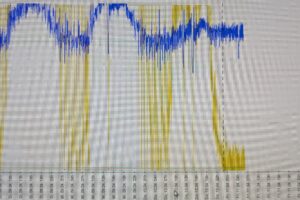NH₃ refrigeration system in large warehouse back in stable operation
For one of our customers, the operator of a large warehouse with three NH₃ refrigeration systems, we were asked to assist with a fault-prone system. Our team was on site at short notice and was able to restore the system to a stable and efficient operating state through targeted analysis and technical measures.
Plant overview
The warehouse is supplied by three separate refrigeration systems:
1× single-stage NH₃ compound system for normal cooling
2× two-stage NH₃ compound systems for the deep-freeze areas
In one of the standard cooling systems, malfunctions occurred during operation, which led to high loads on the condensing unit and unstable control conditions.
On-site analysis – identified problems:
Extraneous air in the NH₃ refrigerant circuit → caused unstable pressure conditions and poor heat transfer
Defective high-pressure transmitter → supplied incorrect values to the control system
Condenser permanently under full load → high condensing pressures with a condensing temperature that is too cold at the same time
Measures implemented:
Professional venting of the refrigerant circuit
Replacement of the defective transmitter to restore reliable control
Adjustment of the control parameters to optimize the condensation performance
Before and after: comparison of control behavior

The following image shows an excerpt from the system visualization – specifically the control behaviour of the condenser fans for controlling the high pressure.
- Blue line: High pressure curve
- Yellow line: Fan requirement
Before our application:
Despite 100% fan demand, the pressure increased continuously. The utilization of the fans showed a restless, clocking behavior without any noticeable effect on the pressure level.
After troubleshooting:
An even, stable pressure profile with moderate fan utilization shows the success of the measures implemented. The system has been running reliably and energy-efficiently ever since.
Result:
Stable operation of the affected cooling system
Normalized condenser load and significantly reduced energy consumption
Restoration of operational safety without interfering with the other system areas
Conclusion
Our on-site support has shown how important in-depth specialist knowledge, experience with NH₃ systems and a structured analysis are in order to get existing systems back on track quickly and effectively.